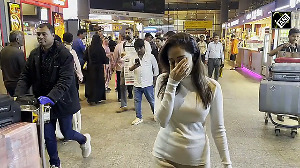First by following the directives, and then persuading Congress-ruled states to follow suit, the Union government must set the ball rolling on police reforms, says Devyani Srivastava.
At the recently-held chief ministers conference on internal security, Prime Minister Manmohan Singh emphatically stressed upon reorientation of the police into a more people-friendly organisation.
He urged the states to carry out police reforms and focus on community policing in order to bridge the gap of mistrust between the public and the police. Recognition of the need for police reforms has gained momentum particularly since the 26/11 Mumbai terror attacks and even found a mention for the first time in the Congress-led United Progress Alliance election manifesto in 2009.
Since then, every chief ministers conference on internal security has touched upon the issue in considerable detail. Unfortunately, this recognition has failed to find resonance with both the state and the Union governments.
Police reforms have either been ignored, neglected, diluted, or at the other extreme, reduced to a particular vision of reform, one that is guided more by concerns of counter-terrorism and counterinsurgency rather than enabling better access to justice.
The most glaring neglect of police reforms is evident in the dismal compliance of both the Union and the states with the Supreme Court directives issued in 2006 in reference to the Prakash Singh v Union of India case. The directives seek to address the issue of politicisation of the police by regulating transfers, postings, and promotions; enhance its accountability through independent bodies; and strengthen its professionalism through regular performance appraisals.
Four years since the judgment, not a single state has complied fully with the directives. To date, only 12 states (Assam, Bihar, Chhattisgarh, Haryana, Tripura, Himachal Pradesh, Rajasthan, Kerala, Sikkim, Punjab, Uttarakhand and Meghalaya) have enacted fresh police acts, while Gujarat has amended its earlier law in order to accommodate the court directives.
The states were to base their legislations on the lines of the Model Police Bill drawn by the Soli Sorabjee Committee in 2006. Yet, most of the new legislation retain several retrograde provisions of the 1861 Police Act and fail to incorporate the safeguards of independence and accountability explicitly drawn up by the apex court and reflected in the Model Police Bill.
The most critical of these safeguards include the directives requiring every state to set up a State Security Commission to oversee the performance of the police and guide its policy, and a Police Complaints Authority at the state as well as district levels to look into complaints against the police.
Neither of these bodies have been made fully functional and, wherever established, they comply only partially with the directives in terms of composition, mandate and power. Members are either not full-time or are appointed directly by the government instead of being empanelled in accordance with the directives.
The performance of the Union government in charge of policing in the Union Territories is equally disappointing. Delhi, for instance, is yet to have its Complaints Authority established. The Draft Delhi Police Act 2010 prepared by the ministry of home affairs ignores the very guidelines of accountability included in the Model Police Bill drafted at the behest of the Union government itself.
In his address, the prime minister called upon the Union Territory of Delhi to serve as a role model, but unless the Union government follows its own guidelines, what moral ground does it have to urge the states to implement police reforms?
Instead of implementing reforms as envisaged by the directives, the other initiatives on police reform reflect a narrow vision, aimed solely at strengthening intelligence gathering necessary for counter-terrorism and counterinsurgency.
The modernisation of police force scheme of the Union government, for instance, is limited to improving the facilities and capacity of police stations, that, although important, is far from sufficient.
Measures necessary for reforming the culture of police organisations that tend to reward violent conduct and attitude towards the local community, particularly in the face of difficult security situations are, ironically, not considered important for building a people-friendly police.
Then, a lot of emphasis is being laid on community policing (most notably by Kerala), but here too, the vision is rather limited. It is mostly understood either as time-bound schemes such as 'village outreach' programmes to be carried out by select officers in order to 'gain community confidence,' or in its extreme form as arming citizens through creation of 'special police officers' in select areas resulting in vigilante groups.
Such measures seek to gain only that much confidence of the people necessary to secure 'actionable intelligence' without really reversing the 'scared-public vs abusive-police' equation.
A deeper understanding of the philosophy -- of 'the police working in partnership with the community to mobilise resources to solve problems affecting public safety over the longer term rather than police, alone, reacting short term to incidents as they occur' -- is yet to be imbibed by police officers. This requires community policing to be understood as the core of police work rather than the margin.
The organisational structure of the police, staffing arrangements and deployment of resources should be organised accordingly.
And above all, the nexus between special security laws and distrust of the police among the community is completely missed -- laws that grant additional discretionary powers to the police and dilute the rights of suspects cannot at the same time lead to a people-friendly organisation.
Community policing initiatives like holding medical camps and organising cultural events hold no meaning when people can be rounded up ruthlessly during investigations. The application of such security laws, in fact, deeply affect police relations with the entire neighbourhood, rendering effective policing impossible.
Instead of such partial and narrow reform measures, police reforms needs to be understood in a comprehensive manner. The Supreme Court directives embody just such an inclusive package that can play an instrumental role in transforming the police into an efficient, accountable, and responsive organisation. First by following the directives itself, and then persuading other Congress-ruled states to follow suit, the Union government must set the ball rolling on police reforms.
Devyani Srivastava is co-author of the report titled Feudal Forces: Reform Delayed: 2010 published by the Commonwealth Human Rights Initiative.






 © 2025
© 2025